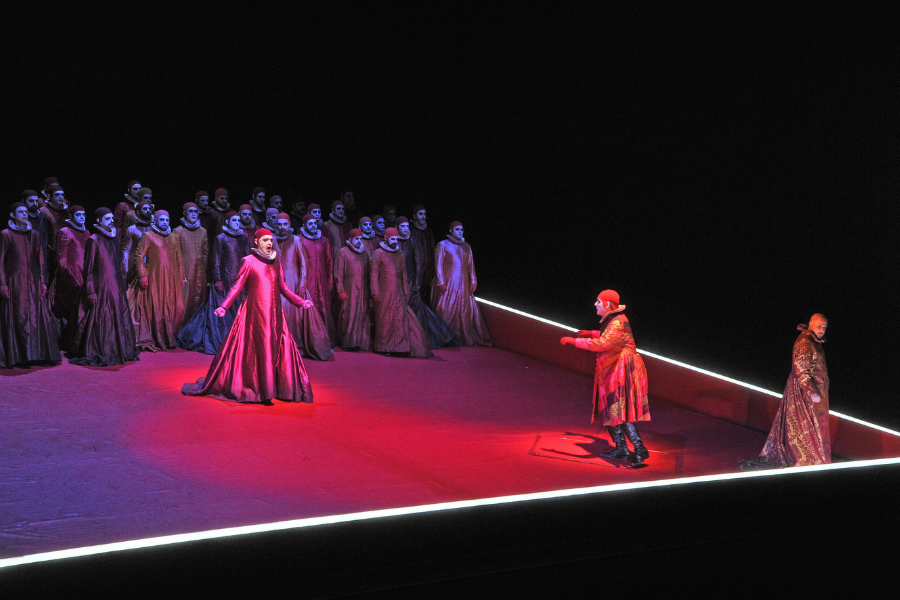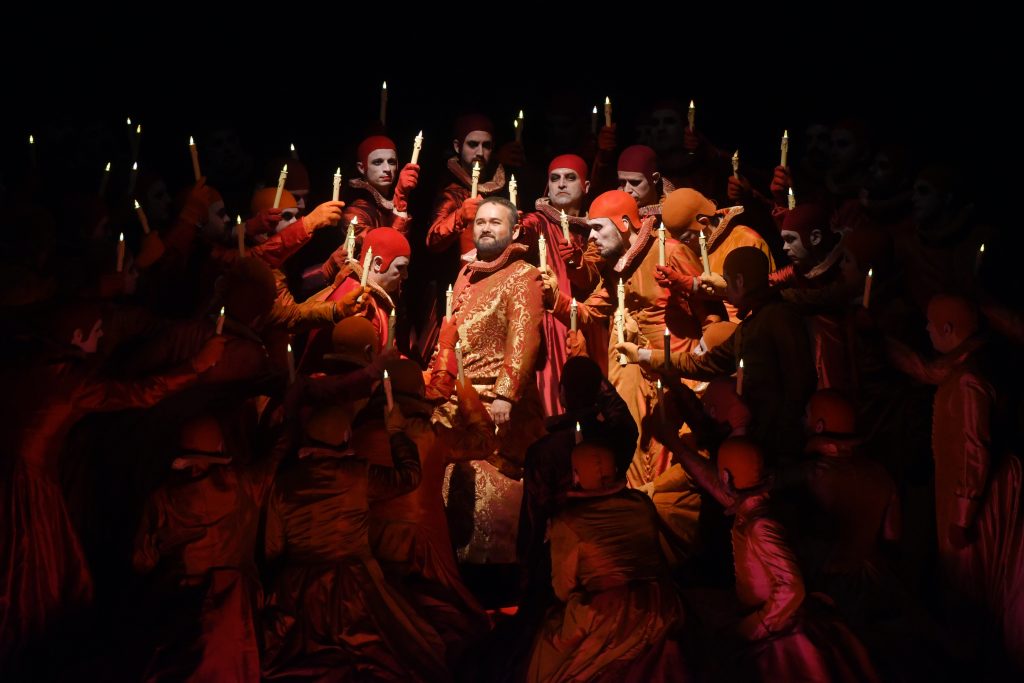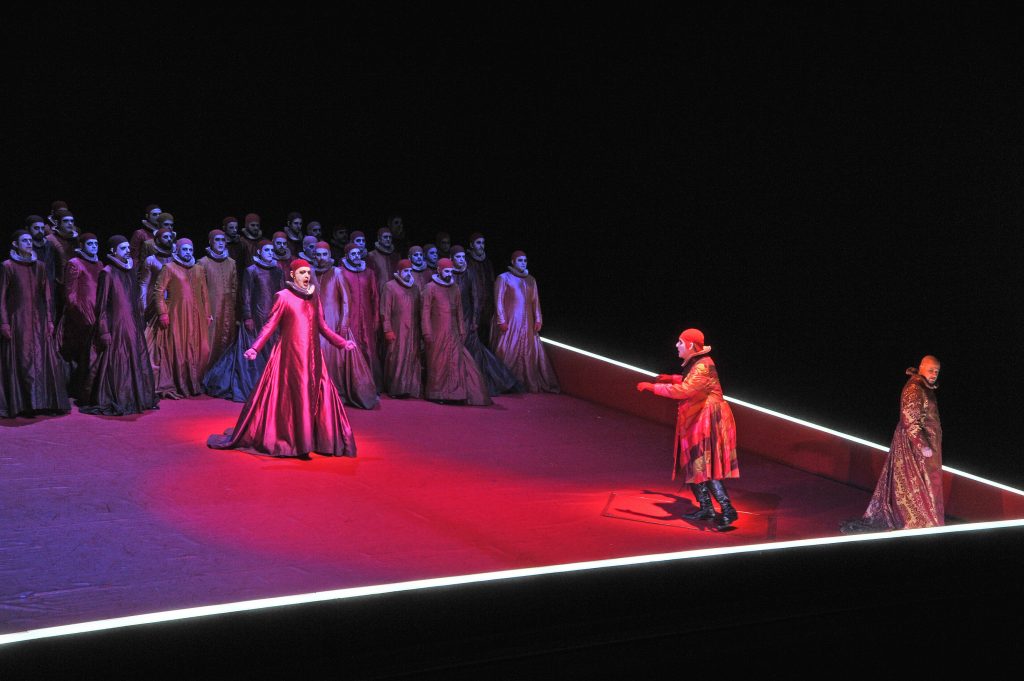“Rigoletto” de Verdi con producción de Monique Wagemakers vuelve al Liceu con el debut escénico en España del tenor Benjamin Bernheim

El tenor francés Benjamin Bernheim, una de las voces revelación del momento, hace su debut escénico a nivel estatal en el Liceu, así como el estreno en el rol de Duque de Mantua, papel que también será interpretado por Simir Pirgu y Josep Bros.
El rol de Rigoletto lo interpretan dos barítonos, el inglés Christopher Maltman y el alemán Markus Brück. En el papel de Gilda, en las funciones del Liceu se alternarán dos sopranos de proyección: Olga Peretyatko y Aigul Khismatullina.
Daniele Callegari dirigirá la Orquesta Sinfónica del Gran Teatre del Liceu en una exitosa producción que también cuenta con las voces de Grigory Shkarupa, Liang Li, Rinat Shaham, Nino Surguladze, Laura Vila, Mattia Denti, Michal Partyka, Moisés Marín, Stefano Palatchi y Sara Bañeras.
Rigoletto está protagonizada por un bufón amargado y celoso que ve como su señor, el Duque de Mantua, seduce y engaña su hija secreta, Gilda, hecho que le empuja a planear una venganza que se le acaba girando en contra.
La directora de escena holandesa Monique Wagemakers desnuda la ópera en una escenografía minimalista y moderna, atravesada por a claroscuros que permiten profundizar en una reflexión desgarradora y actual sobre los abusos de poder.
Uno de los títulos de madurez de Giuseppe Verdi, Rigoletto, regresa al Gran Teatre del Liceu del 28 de noviembre al 19 de diciembre con 15 actuaciones en la célebre producción firmada por la directora de escena holandesa Monique Wagemakers. Se trata de un melodrama en tres actos con libreto de Francisco Maria Piave adaptado de la obra Le roi s’amuse, de Victor Hugo, uno de los escritores y dramaturgos más aplaudidos de Europa antes de las revoluciones de 1848. Verdi ya había adaptado a la ópera una de sus obras más controvertidas, Hernani (1830), una tragedia que causó un gran escándalo porque rompía con la estética clasicista.
Rigoletto se desarrolla en Mantua en el siglo XVI y cuenta la historia de un bufón amargado y jorobado que vive con su hija secreta, Gilda. El Duque de Mantua, su señor, ignora que es su hija y la seduce haciéndose pasar por un estudiante. Luego la viola antes de encerrarla en unas mazmorras. Rigoletto logra liberarla y trama una terrible venganza para hacer pagar la afrenta al libertino, pero por error termina apuñalando a la joven. La ópera se estrenó el 11 de marzo de 1851 en el Teatro La Fenice de Venecia. En Barcelona se estrenó en el Liceu el 3 de diciembre de 1853. Desde entonces, se han realizado 375 representaciones (la última el 6 de abril de 2017) y es la segunda ópera más representada en el Liceu.
En esta ocasión se cotará con la exitosa coproducción del Gran Teatre del Liceu y el Teatro Real que se estrenó el 2009 en Madrid, firmada por Monique Wagemakers. La directora de escena holandesa desnuda la ópera en una escenografía minimalista y moderna, atravesada por un angustioso claroscuro que nos permite ahondar en una reflexión desgarradora y actual sobre los abusos de poder. Como contrapunto, el rojo sangre de un vestuario renacentista acentúa el dramatismo de esta obra protagonizada por un antihéroe: un bufón indignado y ultrajado.
Rigoletto ocupa un lugar especial en la obra de Verdi, entre otros motivos, por ser un puente perfecto entre el lenguaje de juventud del compositor y su rotundo discurso de madurez. Es una de las óperas verdianas con más conexiones directas con la tradición del bel canto, y en su historia se respira el aliento de Shakespeare. Esto obliga a que, en aras de alcanzar una interpretación excelente, todas las piezas en escena –y en el foso– hayan alcanzado una gran madurez interpretativa y estén en el apogeo de su capacidad vocal. El director musical que comandará la Orquesta Sinfónica del Gran Teatre del Liceu es Daniele Callegari, un veterano de la ópera europea –fue director del festival de Wexford y, a día de hoy, director titular de la ópera de Niza– que ha estudiado a Verdi con toda la seriedad que su legado exige. Él tendrá la responsabilidad de guiar al elenco hacia las cumbres de lo sublime, y ciertamente contará con cantantes de prestigio a su servicio que harán que las funciones rayen a gran altura.
En el rol principal de Rigoletto tendremos a dos barítonos, el inglés Christopher Maltman –que a sus 51 años, y tras varios años de éxitos, está en el punto exacto en el que se unen la frescura de la voz y la experiencia de una carrera jalonada de retos difíciles en la ópera y el lied– y el alemán Markus Brück, algo más joven, pero ya en el punto exacto de madurez. En el difícil papel de Gilda, las funciones del Liceu contarán con dos sopranos ligeras de prestigio y proyección: Olga Peretyatko, que ha convertido a la hija de Rigoletto en uno de sus personajes más desarrollados, y la joven rusa Aigul Khismantullina, que regresará al teatro tras ganar la 56ª edición del Concurso de Canto Tenor Viñas, precisamente cantando el aria principal de Rigoletto, Caro nome. El papel del Duque de Mantua recaerá en tres tenores de larga carrera, como Josep Bros –dos funciones, el 3 y el 12 de diciembre–, el albanés Saimir Pirgu –un intérprete que domina este rol con total seguridad– y la nueva sensación joven de la ópera francesa, Benjamin Bernheim.
Peretyatko se dio a conocer cuando ganó el concurso Operalia y desde entonces ha cantado en los principales escenarios de todo el mundo, como la Royal Opera House de Londres, la Ópera de la Bastilla de París y el Metropolitan Opera de Nueva York, entre otros. Debutó en el Gran Teatre del Liceu en la temporada 2009/10 con Die Entführung aus dem Serail y ésta será su segunda visita. Maltman se ha ganado los elogios de la crítica como Don Giovanni, precisamente el papel que desempeñó en su última actuación en Barcelona la temporada pasada. También ha cantado en La bohème (2011/12) y en un concierto conjunto con Anna Netrebko y Yusif Eyvazov (2019/20). Bernheim estudió con Gary Magby en el Conservatorio de Lausana y ha participado en clases magistrales con Jaume Aragall, además de estudiar en la Accademia Verdiana Carlo Bergonzi de Busseto y formar parte del programa para jóvenes artistas de la Zurich Opernhaus. Ha interpretado los papeles protagonistas del repertorio romántico en los mejores teatros del mundo y ahora llega al Gran Teatre del Liceu tras haber protagonizado un recital en el Festival Castell Peralada ese mismo verano.
Daniele Callegari, el nuevo director musical de la Ópera de Niza, dirigirá la Orquesta Sinfónica y Coro del Gran Teatre del Liceu para interpretar esta partitura que representa la transición del bel canto al verismo. Rigoletto, por otro lado, contiene algunos de los éxitos líricos más populares de todos los tiempos: el aria «La donna è mobile» (Acto III) entonada por el Duque de Mantua, que reflexiona sobre el carácter cambiante de las mujeres justo antes de rendirse a su vicio lujurioso. El aria culmina con un do de pecho, que es todo un desafío para los tenores. «Gualtier Maldè … Caro nome» (Acto I) de Gilda, representa el momento en el que la joven, engañada y creyendo que el Duque es un estudiante, se siente embriagada de amor y expresa sus sentimientos apasionados en un aria de coloratura radiante y compleja. En cuanto a Rigoletto, desata su ira en «Sì, vendetta, tremenda vendetta», un dúo con Gilda lleno de contrastes en el que el bufón grita venganza después de que el duque haya secuestrado y encerrado su hija en unas mazmorras.
Sobre la producción
La cuestión del poder, y sobre todo el abuso de poder, es una de las claves de la visión que transmite este Rigoletto de Monique Wagemakers. La relación entre personajes —Rigoletto, Gilda y el Duque de Mantua— se presenta como un triángulo de aristas afiladas: el duque, un sátiro libertino, no ama a Gilda, y en realidad Rigoletto tampoco ama a su hija, a la que mantiene bajo una opresión disfrazada de protección. Solo ella se mueve por un impulso de idealismo y amor, pero termina siendo la víctima inocente de la ira ciega de su padre. Wagemakers quiere acercar la realidad de la violencia inherente a esta ópera a la actualidad, señalando que se trata de temas que aún hoy generan debate: violencia dentro de la familia, violencia contra las mujeres, a veces camuflada de protección, consentimiento a la hora de mantener relaciones sexuales, etc.
Para la directora holandesa, lo que destaca de Rigoletto no es tanto la trama novelística y vibrante de momentos melodramáticos, sino las pasiones atávicas que arrastran a los personajes, que se ven dominados por instintos bajos e impulsos irracionales que los conducen al desastre. A nivel escenográfico, esto se traduce en una especie de ring de boxeo —diseñado por el escenógrafo Michael Levine— que se mueve en el espacio y adopta diferentes colores según los sentimientos que contiene: ira, tristeza, desprecio, furor sexual. Los cantantes se sienten retratados y deben buscar en su interior para maximizar sus emociones.
Alejándose de los decorados grandilocuentes y cortesanos, habituales en esta ópera que transcurre en la Italia del siglo XVI, la directora de escena juega con un elemento clave como la iluminación, diseñada por Rainier Tweebeeke, y también con el llamativo vestuario monocromático de Sandy Powell. El juego minimalista que ofrece este cuadrilátero que se ilumina formando claroscuros sombríos y los trajes rojo sangre inspirados en la Venecia renacentista proporciona una atmósfera que magnifica la teatralidad de la obra. Gracias a una articulación en dos niveles, el cuadrilátero permite jugar con el interior y el exterior, con lo oculto y lo visible, logrando una síntesis perfecta entre canto y teatro.
El suelo del cuadrilátero es táctil para que los personajes no solo marquen un color cuando caminan, sino que también dejen una ligera estela detrás de ellos. Este halo luminoso sirve para resaltar las tensiones que existen entre los personajes y permite ahondar en su psicología. En este sentido, si bien Rigoletto se muestra como un padre abusivo y opresivo, Gilda aparece como una joven ingenua, incapaz de entender los peligros que la amenazan fuera del caparazón donde su padre la mantiene, convencida de que el hombre es bueno por naturaleza, en la línea del «buen salvaje» de Rousseau. El Duque de Mantua, el personaje más perverso —un hombre cínico que se aprovecha de su situación de poder—, se sale con la suya sin un rasguño y sin expresar el más mínimo remordimiento. Representa el poder que prevalece y continúa avanzando sin inmutarse.
Rigoletto es el primer «Joker» —para trazar un paralelismo con la reciente película de Todd Phillips—, pisado por la sociedad, abatido y enloquecido. De hecho, Verdi se había propuesto adaptar el Rey Lear de Shakespeare, pero el proyecto no siguió adelante favoreciendo, por otro lado, la composición de Rigoletto. Se sintió atraído precisamente por la figura del bufón jorobado —que, en cambio, no está en la obra de Hugo— un hombre que no tiene poder sobre su señor, que a su vez lo humilla encendiendo su ira e impotencia. Wagemakers pone el dedo en la llaga para señalar la necesidad de estar siempre alerta para combatir los abusos de poder ya que, de lo contrario, la maquinaria sigue avanzando y el débil, casi siempre, acaba aplastado.
Navidad en el Liceu
A partir de las funciones de Rigoletto, el Liceu se viste de Navidad con la iluminación de la fachada del Teatre de azul y la colocación de un árbol en el vestíbulo histórico. Del mismo modo, a partir del 3 de diciembre también estará disponible la ‘Caixa Regalo Ópera’, un regalo especial en Navidad que incluye dos entradas a elegir entre todas las óperas de la temporada 21/22 del Liceu (a partir de Pikovaia Dama), así como los de danza Giselle y De Scheherezade a yo, Carmen. De La flauta mágica, estarán incluidas en la caja las funciones de los días 27 de junio y 1 de julio. Los puntos de venta serán online y taquillas a un precio de 175€ (con 7 euros de gestos de envío en las compres web). Las cajas adquiridas podrán canjearse a partir del 7 de enero y hasta la fecha de la última función incluida.








